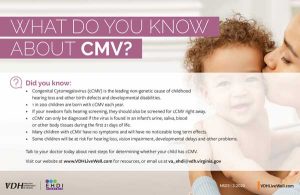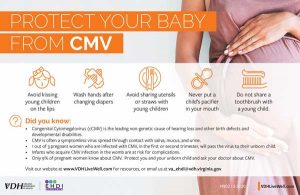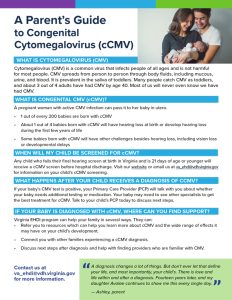What is CMV?
Cytomegalovirus (CMV) is a serious but preventable virus. When a person has contracted CMV, often they may have cold or flu like symptoms or no symptoms at all. It is highly prevalent among healthy children ages one to five years old. One in three five-year-olds are infected, especially in daycare and preschool environments. CMV is primarily transmitted through contact with the saliva of an individual actively carrying the virus. Asymptomatic toddlers can also shed the virus for extended periods, ranging from three to six months or longer.
When a pregnant woman contracts CMV, there is a significant risk (1 in 3 cases) that she will pass the virus to her unborn child. CMV can cross the placenta and lead to serious complications for the baby such as developmental disabilities, microcephaly, and hearing loss. This is known as congenital Cytomegalovirus (cCMV).
Congenital Cytomegalovirus (cCMV) is the most common viral infection and the leading non-genetic cause of hearing loss among infants born in the United States. Approximately 1 in 200 babies are born with cCMV each year. Hearing loss may manifest at birth or later in early childhood. Despite its prevalence, only 9% of women are aware of CMV. Approximately 50% of children affected by cCMV will experience further deterioration in their hearing over time.
Tips to Avoid Passing cCMV to Your Child

- Avoid kissing children
- Wash hands regularly
- Avoid sharing utensils or straws
- Never put a child's pacifier in your mouth
- Do not share a toothbrush with a young child
cCMV Screening at Birth
As of September 2020, any child who fails their hearing screening at birth should receive a cCMV screen before discharge. The screening should be done before 21 days of life. It is essential to make sure that if your child fails the hearing screen at birth, they are tested for cCMV before hospital discharge.
Next Steps After Screening
| Screening Result | Recommendation |
|---|---|
| Not Detected | Talk to your child’s PCP to discuss next steps |
| Detected | Child should have a urine CMV Polymerase Chain Reaction (PCR) collected before 21 days of life
Talk to your child’s PCP about cCMV and next steps. |
| Unsatisfactory Evaluation | Urine CMV PCR collected before 21 days of life
Talk to your child’s PCP about cCMV and next steps. |
| No cCMV test done in hospital | Saliva or urine CMV PCR collected before 21 days of life.
Talk to your child’s PCP about cCMV and next steps. |
Talk to your child’s PCP about CMV or contact Virginia EHDI at va_ehdi@vdh.virginia.gov or 804-212-3020.
Resources and Materials
Links/Resources:
- National CMV.org
- 5.3 Congenital cytomegalovirus (cCMV)
- Knowledge of congenital cytomegalovirus (cCMV) among physical and occupational therapists in the United States
- Congenital cytomegalovirus: Impact on Child Health
Contact Us:
Questions, comments, concerns? Contact us at VA_EHDI@vdh.virginia.gov




